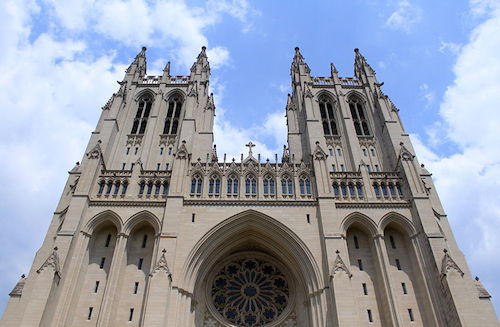
I only just learned that Guided By Voices is back together. Rod Smith had them on in the car as we zipped past the Washington National Cathedral, America’s valentine to the Middle Ages it didn’t have to have, and I liked the album well enough to buy it when I got home to Portland. (I picked up the last copy at Jackpot Records on Hawthorne.)
Strictly speaking, the band never really broke up. Bob Pollard has kept the records coming in a frightening torrent since the ‘90s, sometimes under different names, sometimes as GBV, always at a clip that outpaces any normative conception of craft, care, or inspiration. He reminds me in that way of Clark Coolidge, who reads at events from those jumbo unpublished album-sized sketchbooks which I like to imagine lined up, spine to black spine, in identical floor-to-ceiling bookshelves at his home in Petaluma, Clark scratching his head over which to pull down just before he splits for a gig.
Diehards, don’t hate, but GBV’s 21st-century iterations are to the original band what the National Cathedral is to Notre Dame. What Rod played though was the reunited “classic ‘90s” lineup, or one close enough to promise a return to form.

The mystique (and mistake) of getting back together is a hoary pop music trope that doesn’t really exist, at least in any way I can think of, in poetry. I saw some of the Language poets at the “Poetry of the 1970s” conference in Orono, Maine reproduce a collective writing experiment they’d done in the group’s early years, where one poet read aloud from a book chosen at random, while the others wrote riffs on what they heard or misheard. The performance was understood to be a tribute though, pitched to the conference theme, with no promise that exciting new work would come out of it in the present. (It was at the same conference that Bernadette Mayer, in a keynote reading with the other conference honoree, Clark Coolidge, playfully defused the reunion-tour ambience by joking about the marathon duration of readings in the “real” 1970s, a sly reminder that our late aughts version could only be a museum-grade simulacrum.)
I’d like to think that poets don’t return to form, or assume the glamour of classic lineups so readily because they’re too busy fighting for their forms in the present. Fighting for time and attention, fighting to innovate, fighting just to carve them out of the silence. We don’t share a collective idea of what makes a poem a poem in the same way we do what makes a rock song rock. For all his manic creativity, Pollard works a fairly narrow turf of riffs and amps, bridges and effects openly lifted from the guitar terrain of the ‘60s and ‘70s. While the fascination of poetry, since Stein, Pound & Co. blew down the doors of Victorian perception, is in the not knowing how to proceed. A cathedral, even a faux one, says “Middle Ages”; a Rickenbacker and a power chord say “1960s.” What, in 2014, says “poem”?
“Das Klassiche nenne ich das Gesunde,” wrote Goethe, “und das Romantische das Kranke.” Classical healthy, modern sick. Whole Alps of ink cartridges have emptied over that cranky koan, but I’m more intrigued by the bit that comes after. “Most of the new poetry,” Goethe told Eckermann, Boswell’s rival for lit’s greatest groupie, “is not Romantic because it is new, but because it is weak, sickly, and ill, and the old is not classical because it is old, but because it is strong, fresh, cheerful, and healthy.”
I’m not sure what a “fresh, cheerful, healthy” poetry would look like; I’ve got a better idea, thanks to Baudelaire, Poe, and Morrissey, of the pull of the sickly and ill. But I appreciate how Goethe unhooks poetry from the engine of linear progress, gives the newest art something besides being new to do. In the same way, I appreciate Guided By Voices reaching back to the same vintage pedals and progressions, untroubled by the need to break fresh ground. Both work from an alternate measure for art, one that ignores the feeling for history as Twitter feed, fresh posts grabbing all the eyeballs, the old pushed down into archive.
And yet while few poets I can think of take the idea of an avant-garde very seriously right now—ahead of the column, nose to the future, tomorrow’s forms spotted today—I also don’t know many in tune with the “don’t write them like they used to” mood of, say, Yeats’s “The Nineteenth Century and After”:
Though the great song return no more
There’s keen delight in what we have:
The rattle of pebbles on the shore
Under the receding wave.
I have a sense that we’re waiting around right now poetry-wise—not healthy or sick, but in stable condition—for the next aesthetic wave to break, like the one that winnowed 19th-century American poetry to just Whitman and Dickinson, or cut Elizabethan drama down to Shakespeare. It’s hard to imagine, from the present, a time when John Ashbery’s lush evasions might read like Longfellow, or Guided By Voices sound as fusty and intricate as madrigals. But by the Twitter logic of history, this, or something just as capricious, is bound to happen.
Still, how do you mine the data sink of contemporary poetry without some notion of futurity, however prone to collapse? Even the doubters, a Goethe or Yeats, felt its tug, if only to whinge and set course the other way. Did the worthies who brought us the National Cathedral think they were giving us a fresh, cheerful, healthy Middle Ages to replace the sick European one we got stuck with? Should they have cared, when they laid the final finial, that comebacks so rarely point forward? Should we?
Koeneke was born in Omaha, Nebraska, and grew up in Tucson, Arizona, and Los Angeles. He is the author...
Read Full Biography

